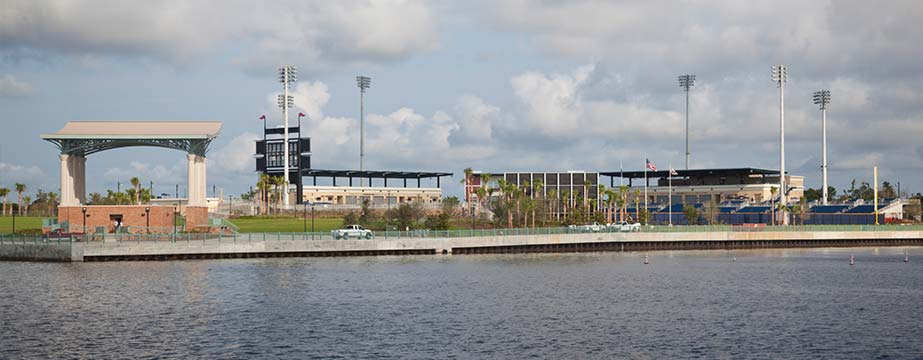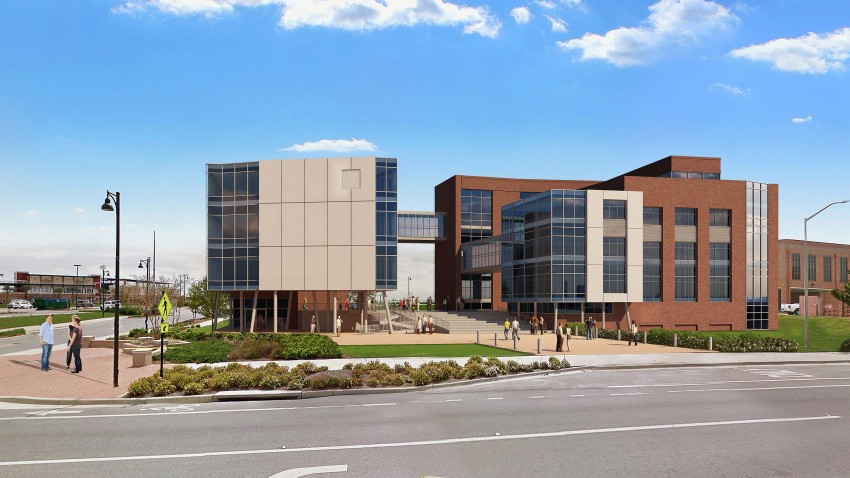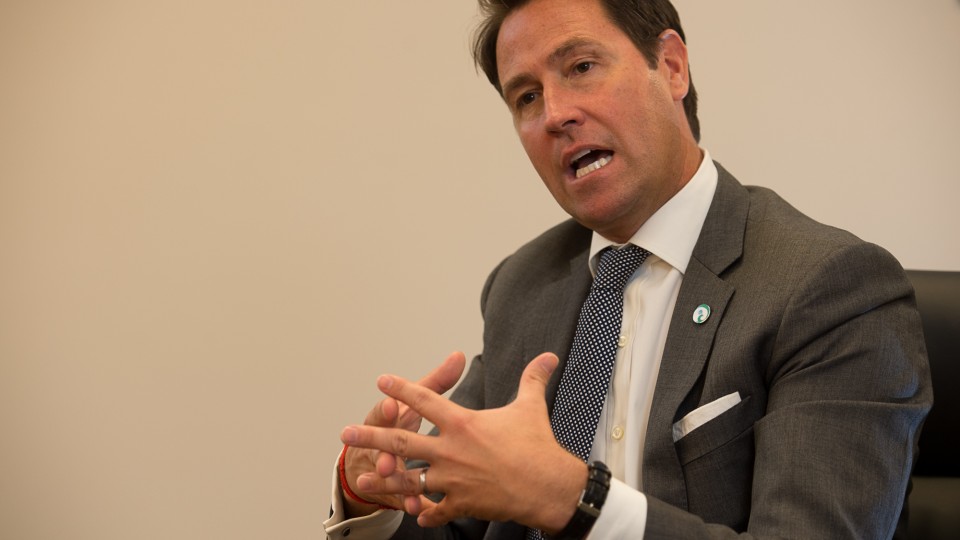Miami developer out of running for Maritime Park
- August 15, 2015
- / Shannon Nickinson
- / community-dashboard

The Community Maritime Park in downtown Pensacola.
A South Florida based developer is out of the picture for the Community Maritime Park.
Pensacola Mayor Ashton Hayward III said on Aug. 14 he “hasn’t heard anything” from MCM-BAP since they presented a proposal to the City Council in June to develop three parcels at the downtown waterfront redevelopment site.
“To our knowledge, I think they are out of the picture,” said City Administrator Eric Olson.
The a Miami-based developer in January presented their vision for the park, including plans for a hotel and boutique apartments, an investment then said to total $65 million.
Mayor Ashton Hayward's interview with SCI
Pensacola Mayor Ashton Hayward III spoke with Shannon Nickinson on Aug. 14 about some of the issues that have swirled around city hall in recent weeks.
Read a Q-and-A from that interview here.
In June, the proposal had shrunk to a $43 million project that includes a Hilton hotel on Parcel 4, parking on parcel 5, and 200 rental or condo units on parcels 7 and 8.
Both the Community Maritime Park Board and City Council were cool toward the revised proposal. MCM-BAP principle Erik Valderrama said he would bring back a revised rent proposal.
CBRE sent a letter to Tamara Fountain, then the city's chief operating officer, on July 23 indicating they would not pursue housing without concessions from the city and discounted rent. "MCM-BAP remains interested in the project and is communicating with other potential niche development partners," the letter says. Read it in full here.
The MCM-BAP offer came at the same time a $20 million proposal by Quint and Rishy Studer to develop three other parcels at the park.

A rendering of the University of West Florida Center for Entrepreneurship as proposed at the Community Maritime Park.
Those plans would have included a campus for the University of West Florida Center for Entrepreneurship, a conference center, a daycare center and a sports museum. Read here how the leases were consumed by mistrust and miscommunication.
I spoke with Hayward and Olson about a path forward for developing the park.
Hayward: Everybody would like to develop over there. It comes down to money. Are they going to make money? Does it fit into what we want as a city? Is the demand there? I think you’re going to see more demand for people to stay in town. I think our downtown is becoming so attractive, people are loving being downtown.
I think the verdict is still out, you know what is the highest and best use of the Maritime Park. Having a Double A baseball team is fabulous. That’s created serious momentum, and people love coming downtown and being at that park. Blues on the Bay. (The concert series sponsored by Blues Angel Music.) I went to the first one, and there a couple hundred people there. Now it’s packed on Sundays. People are starting to get that feel of going to the park. I think you’ll see more people beginning to look at that park.
You’ve got to go back in my opinion and look at how the deal was set up. The process is broken. We know that. They see that process and they get turned off. And I think people get turned off by negative press, and they get turned off because there a distinction between reality and truth, and what’s fun to jump on at the time. We need to remember the momentum that we have and the good that we’ve done.
As Ashton Hayward, I didn’t like the process, and I tried to get on the CMPA board, and they didn’t put me on the board. I think that’s interesting. Now we’re at 2015. The CMPA was put in place for the bond issue. They’re an agent for the City Council. If you think about it, in a town of 50,000 people you’ve got the CMPA board, the Council, the (Community Redevelopment Agency). When I got into office in 2011, I was like all of these layers of bureaucracy are very challenging to weave in and out. I think that’s a very frustrating process when the voters said we want a strong mayor. We want the mayor to be accountable — good, bad, indifferent, and there’s going to be bad — but it is frustrating. We saw the frustration with Mr. Studer. He understands what happened with the CMPA. But at the end of the day the city is the backstop to the taxpayers. The bonds are due in 2040.
There’s a lot of personalities that we all know, and they are volunteers, and I respect that greatly. And I understand (Studer’s) frustration. He’s a big stakeholder out there. As the mayor and the city, we want the best for the park as well, for future people who come in there and to protect what’s been invested there already.
Q: And the line is not long for other offers.
Hayward:: The line is not long. I’ve said that publicly. We have someone who is ready and willing and has a track record and has done quality development. That frustration, that would have been me, too.
Q: What do you think would have made that process better?
Hayward:: Legally, we can’t get rid of the CMPA. They’ve done a fabulous job of doing their best and trying to support the citizens, but I think it’s time to move on. I think the City Council needs to take over. (The CMPA) can manage the ballpark and the grounds, but we need to shrink the layers so that potential developers can go to Council and have discussion with the mayor. Between the CMPA Board, the Council and the mayor, that’s 21 people giving input. I’d like to see that go away.
In 2017 there’s an opportunity for that board could go away and we can go shrink the process. And we can have a stronger dialogue, if you will.
Q: Where is the template lease process?
Hayward: John Daniel and (law firm) Beggs & Lane is working on that. And he’s going to get that finished. I’ve reached out to see if we can get (Studer attorney) Scott Remington’s comments when (Daniel) is finished. And going forward the process needs to be simpler. We need to set the expectation for any future developer out there: This is what we’re expecting in the template, and you’re going to negotiate. But we can get that out of the way so that this process of talking about things doesn’t go on for weeks and months.
Q: As a citizen, it’s difficult to watch.
Hayward: It’s very difficult to watch. It was difficult for me long before I even thought about being the mayor. It’s extremely frustrating for me. I’ve sat up here by myself going, “God, this is killing me.” In business, you get in a room, you talk to people, you say “Do you have financing? Can you do the deal? Are you in or are you out?” But we’re government. It’s a very challenging process.
I don’t know if there’ s a perfect answer in 2015, but I would like to see those duties given over to the Council.
Q: So where do you go if you have an idea to develop down there?
Hayward: Here. (Mayor’s office). The mayor’s office gets a lot of calls from people looking to start a business or bring a business to Pensacola. One of the strong things in my administration is we welcome people from the outside. We welcome outside developers. Mr. Studer and I have talked about this. I think he’d love to see some more people come in start writing checks.
Q: Otherwise we are just shining each other’s shoes.
Hayward: Right. And that’s a great point, because we can’t just exchange between us. We need to bring in outside money. And I think we’ve demonstrated that. Especially in the county at large with big employers coming in here, with VT-(Mobile Aerospace Engineering) coming in here (to Pensacola International Airport), with small businesses we’ve seen on Palafox. We get a lot of calls. I’m sure the Chamber does, too. I’m sure FloridaWest gets calls. That’s how the process works.
Q: CMPA then is out of that loop.
Hayward: The City Council has a big decision to make and I think it’s an opportunity for them. They’ve been very vocal the last few weeks. I think the council wants to be part of the process. They want to have their input and share their ideas and I welcome that of course. They want to be a part of it.
Q: So when is John Daniel going to give you the lease template?
Hayward: I’m sure it would be next week, I assume.
Olson noted that staff has come up with a few versions of a flow chart of how a proposed lease could flow between the CMPA and the city, but he says it is premature to talk about what those details are. “We are coming up with the process and we have to vet it through all of the stakeholders,” he said.
Q: Sure, but that process has been broken for five years.
Hayward: This is very frustrating for someone like me to be blunt. Being a strong mayor, there is a learning process when you come from the private sector it’s challenging for a politician. We want input. Public input is critical to the success of any city, but we’ve got to pick the way we’re going, pick the street we’re going down and go forward in a way that’s transparent. The process is broken. It needs to be fixed and we’re in the process of fixing that, hopefully for the last time. It’s just ... personalities are challenging, I’m sure mine is.
There’s no reason why we can’t get this done and get past it all. There’s too many positive things going on.
Q: But there is a situation in the public’s mind right now.
Hayward: Sure.
Q: So, what do you do to fix that situation as the strong mayor. The buck stops over there.
Hayward: I’m glad you said that. A lot of time I haven’t gotten the question to me — it’s come to the CMPA and the council. To move forward, we greatly appreciate everything the CMPA board has done. Let’s turn it over to council to sell the rest of these properties or lease them up so we can work together the mayor and the council with developers and create like a one-stop shop. Just like we do every Wednesday with (city inspection services administrator) Bill (Weeks) and (city planning services administrator) Sherry (Morris). Rebecca Ferguson (city economic policy coordinator) can meet with a developer in my office, and the council president can be in that meeting and brief the council afterward. And Rebecca can brief me and put it forward.
With this new template lease, the expectations will be, this is what it is. Don’t be bringing any goofy offer and (think) we’re going to approve. This is it.
Even though this process has been challenging, I feel like we’re fortunate that we have a big stakeholder in Mr. Studer over there. We’re in the black, we’re paying our bills. 2008 was rough — I don’t believe in seven years we thought we would be where are. A lot of us didn’t know what was going on. That’s a positive. The concept moving forward is a one-stop shop. It isn’t that hard.
Q: It shouldn’t be.
Hayward: It shouldn’t be.
Q: But we make it that hard. It’s a Pensacola specialty to make it that hard.
Hayward: It doesn’t need to be that hard. I ran into people from Niceville the other day, and they were blown away. We’ve got too much going to on to constantly be bickering where the outside folks that might have stayed at our lovely beach, that might have stayed at our lovely downtown, and said it would be great to a second home in Pensacola instead of the east or the west. Not that we wouldn’t want a regional approach, but we would love them in Pensacola. Where before we got past over all the time to Destin or Walton County. From the outside, we’ve got to stop this outside bickering.
I think everyone’s interest is, they want the best for the community but sometimes in spite of ourselves, we cut our nose off to spite ourselves.

 CivicCon launches with a look at good growth in cities
CivicCon launches with a look at good growth in cities
 Building stronger brains one baby, one parent at a time
Building stronger brains one baby, one parent at a time
 SCI debuts commercial on Early Learning City
SCI debuts commercial on Early Learning City
 Entrecon: World class speakers and an opportunity to sharpen skills
Entrecon: World class speakers and an opportunity to sharpen skills
 PYP Quality of Life survey 2017
PYP Quality of Life survey 2017
 EntreCon Pensacola 2016: A look back
EntreCon Pensacola 2016: A look back
 Leadership tip: getting better employee takeaways
Leadership tip: getting better employee takeaways
 Leadership tip: be interested instead of interesting
Leadership tip: be interested instead of interesting
 Leadership tip: delivering difficult messages
Leadership tip: delivering difficult messages
 Brain Bags boost Arc, Early Childhood Court programs
Brain Bags boost Arc, Early Childhood Court programs